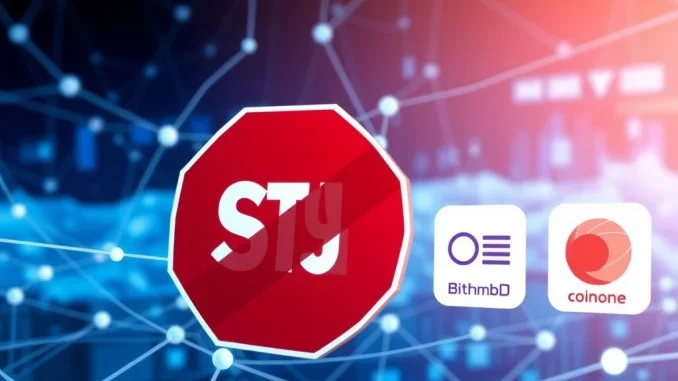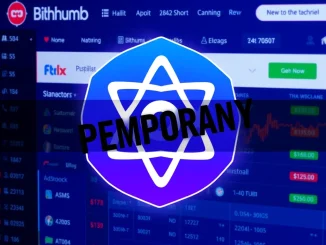
Attention SUI holders and cryptocurrency traders! If you use major Korean exchanges like Upbit, Bithumb, or Coinone, you might have noticed you can’t deposit or withdraw your SUI right now. This isn’t a random outage; it’s a direct response to a security issue impacting the SUI network ecosystem. The decision to halt SUI transactions suspended comes after an incident involving Cetus, a prominent decentralized exchange (DEX) operating on the SUI blockchain. This move highlights the interconnectedness of the crypto world and how issues on one platform can trigger cautionary measures across others, especially among centralized exchanges prioritizing user asset safety.
Why Did Korean Crypto Exchanges Suspend SUI Services?
The temporary suspension of SUI deposit and withdrawal services by leading Korean crypto exchanges – specifically Upbit, Bithumb, and Coinone – was initiated as a protective measure. The trigger for this action was a reported security breach or incident concerning Cetus, a decentralized exchange built on the SUI network.
Here’s a breakdown of the situation:
- The Trigger: A security incident occurred on Cetus, a DEX native to the SUI blockchain. Details of the incident itself (like the exact nature of the exploit or vulnerability) are often investigated, but the fact of a breach is enough to raise concerns.
- The Response: Centralized exchanges (CEXs) like Upbit, Bithumb, and Coinone need to ensure the integrity of the networks they support before allowing user funds to flow in or out. A security issue on a major protocol within a network, like Cetus on SUI, can potentially pose risks to users depositing funds from or withdrawing funds to affected parts of the network.
- The Action: To mitigate potential risks to user assets and maintain the stability of their platforms, the exchanges decided to temporarily halt the movement of SUI tokens. This is a standard precautionary step taken by exchanges when uncertainty or potential compromise is detected on a network they list assets from.
Understanding the Cetus DEX Incident and SUI Network Security
Cetus is a significant decentralized exchange within the SUI ecosystem, offering swapping and liquidity provision services. Security incidents on DEXs can range from smart contract exploits to issues with associated protocols or bridges. While specific details of the Cetus DEX incident might still be emerging, the fact that it prompted action from major exchanges suggests it was perceived as a credible threat or source of instability.
This event also brings broader attention to SUI network security. While the incident occurred on a specific application (Cetus) built on SUI, exchanges need to assess if the vulnerability or incident has wider implications for the core network or other critical infrastructure. The temporary halt allows exchanges time to:
- Gather information about the Cetus incident.
- Assess if the incident has any impact on the SUI network layer itself.
- Determine if there are any risks associated with processing SUI transactions originating from or destined for affected areas of the network.
- Coordinate with the SUI foundation and Cetus team for updates and resolutions.
It’s a necessary pause to ensure that when services resume, user funds are safe and the network connection is secure.
Impact on Users: What the Suspension Means for SUI Holders on Upbit, Bithumb, and Coinone
For users holding SUI on Upbit Bithumb Coinone, the primary impact is the inability to move their SUI tokens off or onto these platforms. If you needed to withdraw SUI to a private wallet or another exchange, or deposit SUI from an external source, you will currently be unable to do so.
While trading of SUI on these exchanges may continue (this often depends on the exchange’s specific policy during such events, but the focus here is deposits/withdrawals), the inability to move assets can be inconvenient and may cause concern. It’s important for users to stay informed and monitor official announcements directly from the exchanges.
This situation underscores a key challenge in the crypto space: while decentralized protocols like Cetus offer peer-to-peer trading, many users still rely on centralized exchanges for access and liquidity. Security issues on decentralized layers can, in turn, affect the services provided by these centralized gateways.
When Can Users Expect SUI Transactions to Resume?
The exchanges have stated that the suspension is temporary. Services for SUI transactions suspended will resume once the situation is deemed secure. What does “deemed secure” mean in this context?
It typically involves:
- Confirmation that the incident on Cetus has been contained or resolved.
- Verification that there are no lingering vulnerabilities impacting the SUI network or the exchanges’ integration with it.
- Successful internal testing by the exchanges to ensure their SUI wallets and infrastructure are operating safely.
- Coordination and communication with the SUI project team to get official clearance and updates.
There is no fixed timeline for this process. It could take hours or potentially days, depending on the complexity of the Cetus incident and the thoroughness of the security checks required by the exchanges. Users should rely only on official announcements from Upbit, Bithumb, and Coinone regarding the resumption of services.
Summary: A Precautionary Pause for SUI on Korean Exchanges
In response to a security incident affecting the Cetus DEX on the SUI network, major Korean crypto exchanges, including Upbit, Bithumb, and Coinone, have taken the precautionary step of temporarily suspending SUI deposits and withdrawals. This measure is aimed at protecting user assets while the exchanges monitor the situation and assess potential risks associated with the Cetus DEX incident and overall SUI network security. While inconvenient for users needing to move SUI, this action reflects a commitment by the exchanges to prioritize security. Services for SUI transactions suspended will be reinstated once the exchanges are confident that the environment is safe. SUI holders on these platforms should await official notifications for updates on when normal service will resume.



